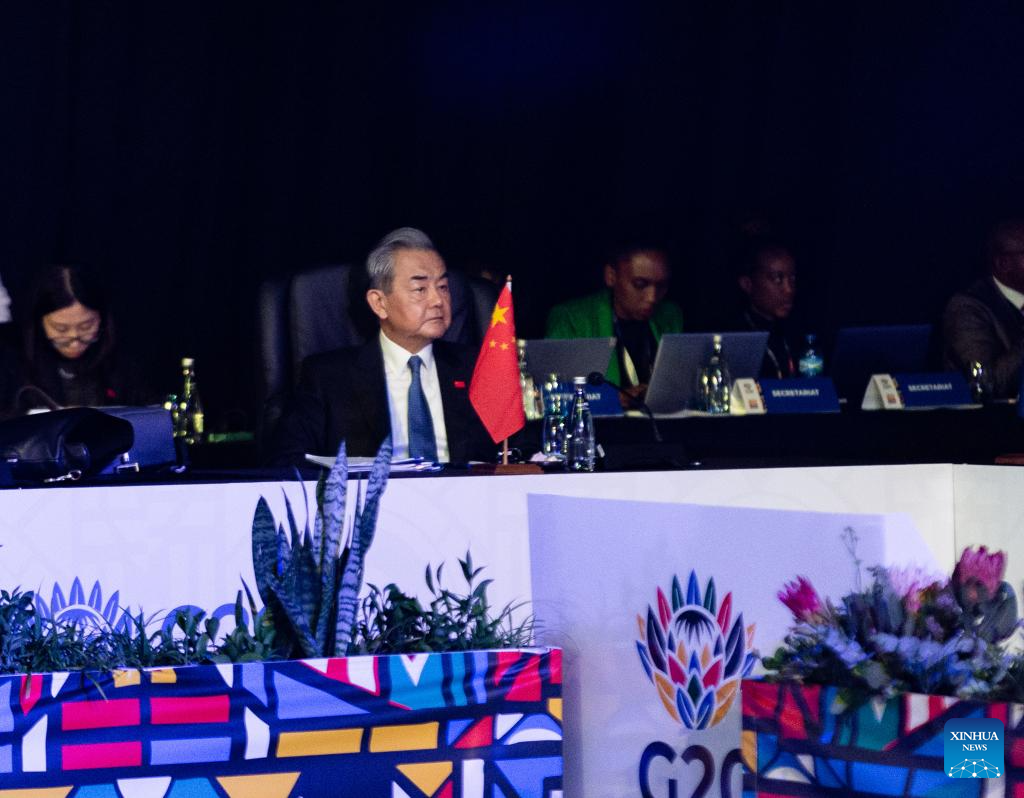In speech at Johannesburg meeting, Chinese FM stresses multilateralism

Foreign Minister Wang Yi called on the Group of 20 members to work together to uphold peace and stability to build a more secure world, reiterating the need to defend multilateralism and enhance the role of the United Nations to address global challenges.
Wang, who is also a member of the Political Bureau of the Communist Party of China Central Committee, made the remarks in a speech on Feb 20 at the G20 Foreign Ministers’ Meeting in Johannesburg, South Africa.
The meeting came amid the complex evolution of the international landscape, with the Ukraine crisis continuing and the Gaza crisis lingering. It also took place as South Africa assumed the presidency of the G20 for the first time.
Wang said the G20 members should work together as guardians of world peace, creators of universal security, and defenders of multilateralism.
He emphasized that all countries should respect each other’s sovereignty and territorial integrity, as well as their independent choice of development path and social system.
“We should resolve differences between countries peacefully through dialogue and negotiation and address international and regional hot spot issues through political means, without resorting to bloc confrontation or interfering in the internal affairs of other countries,” he said.
Noting that humanity is an indivisible security community, Wang highlighted that the security of one country should not be at the expense of that of others, adding that the legitimate security concerns of all countries should be taken seriously.
While calling for defending multilateralism, the senior diplomat stated that the more complex the international situation is and the more prominent global challenges become, the more important it is to uphold the authority of the UN and give full play to its role.
Regarding the Ukraine crisis, Wang said the window for peace is opening. China supports all peace efforts, including the recent consensus reached between the United States and Russia, and looks forward to all parties involved finding a sustainable and lasting solution that accommodates each other’s concerns, he said.
China is willing to act on the demands of the parties involved, take into account the concerns of the international community, especially countries of the Global South, and continue to play a constructive role in the political resolution of the crisis, he added.
As for the Gaza conflict, Wang called for continuous and effective implementation of the ceasefire agreement and emphasized that the two-state solution is the only viable solution.
The G20 Summit will take place in November in South Africa, which places “solidarity, equality, and sustainability” at the center of its G20 presidency.
At the opening of the G20 Foreign Ministers’ Meeting on Feb 20, South African President Cyril Ramaphosa urged inclusiveness, cooperation, and reform.
US Secretary of State Marco Rubio skipped the two-day G20 Foreign Ministers’ Meeting, which would normally be an opportunity for him to push for support on US positions, especially at the start of a new administration.
Rubio earlier said that he would also not attend the main G20 Summit in Johannesburg in November.
Analysts said Rubio’s absence reflects the current US administration’s indifference to organizations promoting international cooperation.
Anthony Moretti, an associate professor at the Department of Communication and Organizational Leadership at Robert Morris University in the US, said Rubio’s absence from this important international meeting will have negative ramifications for US-South African relations, as well as Washington’s influence over global discussions on the Global South, climate change and international trade.



